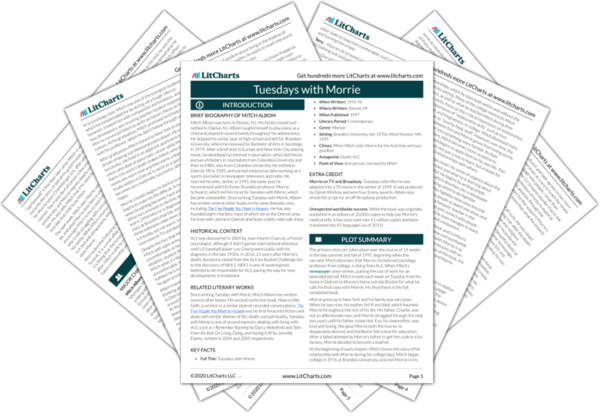Summary
Analysis
Morrie is lying in bed, dressed in pajama bottoms, and Mitch is helping Morrie’s physical therapist pound on Morrie’s back to loosen the phlegm in his lungs. This has to be done regularly. On this Tuesday, Morrie’s therapist is visiting earlier than usual, and rather than excuse himself as he usually does, Mitch decides he’d like to be there. Mitch says he’s increasingly less self-conscious about the physical embarrassment, which isn’t like him, but he notes that much of what goes on at Morrie’s house isn’t normal for him.
Mitch here seems fully cognizant and accepting of the change he's undergoing. He's fully present, he's willing to do something that involves intimate physical touch, and he's not self-conscious about it. He does note that this isn't normal for him, as if wondering at the new person he finds himself to be.
Themes
As Mitch works on Morrie’s back, he notices how small Morrie is now, and how pale and limp Morrie’s body is. Mitch thinks about how much time people spend working out and trying to shape bodies, only to end life like Morrie. Mitch says the truth is that he was pounding Morrie’s back when he’d rather be hitting walls.
While previously we've tracked the progression of ALS through what Morrie can do, now we see what Morrie's body looks like. This shift is disturbing to Mitch.
Themes
Later that day, Mitch and Morrie are discussing culture. Morrie says that people are only mean when they’re threatened, and the structure of modern culture threatens most everyone, which is why he doesn’t buy into it.
Morrie's idea of detachment comes into play here—he can (he believes) detach from the culture, which allows him to exist in it without feeling threatened like everyone else.
Themes
Mitch and Morrie are holding hands, and Mitch squeezes Morrie’s hand. Mitch tells the reader that they hold hands regularly now, and things like Morrie’s catheter bag and the smell of the room after Morrie uses the bathroom no longer bother or embarrass him.
Mitch has made major progress. He is no longer resisting physical contact with Morrie, which strengthens their relationship.
Themes
Get the entire Tuesdays with Morrie LitChart as a printable PDF.

Continuing their discussion, Morrie expands on his idea of building his personal culture. He says he follows basic rules of the community, like traffic signals, but he chooses what he values and how he thinks rather than letting the culture dictate them. He says there’s nothing inherently shameful about his condition, for example, although the culture says there is.
Mitch asks Morrie why he didn’t move to a place where people are less selfish. Morrie replies that every society has its own problems and running away wouldn’t work. He continues, saying that people don’t believe how alike they truly are, and if people saw each other as being more alike, many of the world’s problems would be fixed. Morrie has one final piece of wisdom: as infants we need others to survive, and at the end of life we need others to survive as well, but the secret is that we need others in between as well.
Morrie's ideas about culture are very much linked to his ideas about community and love, as he prescribes more community building to heal the ills of modern culture. He advocates a greater sense of collective community, which he believes is lacking in individuals who are not infants or the elderly—that is, not those who unquestionably need care.
Themes
Later in the afternoon, Connie and Mitch go into a bedroom to watch the verdict of the O.J. Simpson trial. It’s a tense scene, and when the foreman reads that Simpson has been found not guilty, Connie shrieks. The TV shows black people celebrating outside the courthouse, and the decision is called momentous. Connie leaves the room, having seen enough. Mitch continues to watch, thinking that everyone in the world is also watching, and hears from the other room Morrie being lifted onto the toilet. The thought makes Mitch smile.
The thread of the O.J. Simpson trial is a very tangible example of modern culture and the media as negative entities in the book. We've seen how the constant media storm has allowed the trial to consume people's lives, but here Mitch emphasizes how little Morrie cares about this major cultural event when he notes that Morrie is on the toilet during the verdict.
Themes
In a flashback to 1979, Morrie is at a basketball game at Brandeis, where the team is doing very well. The Brandeis students began to chant “we’re number one!”, which perplexes Morrie. He finally stands up and yells, “what’s wrong with being number two?” The students stop chanting, and Morrie is triumphant.
Rather than be invested in winning and making it to the top, Morrie sees everyone as people, not winners and losers. Morrie's ideas of personal culture shine through here, as well as his desire to seize every possible teaching moment.
Themes












